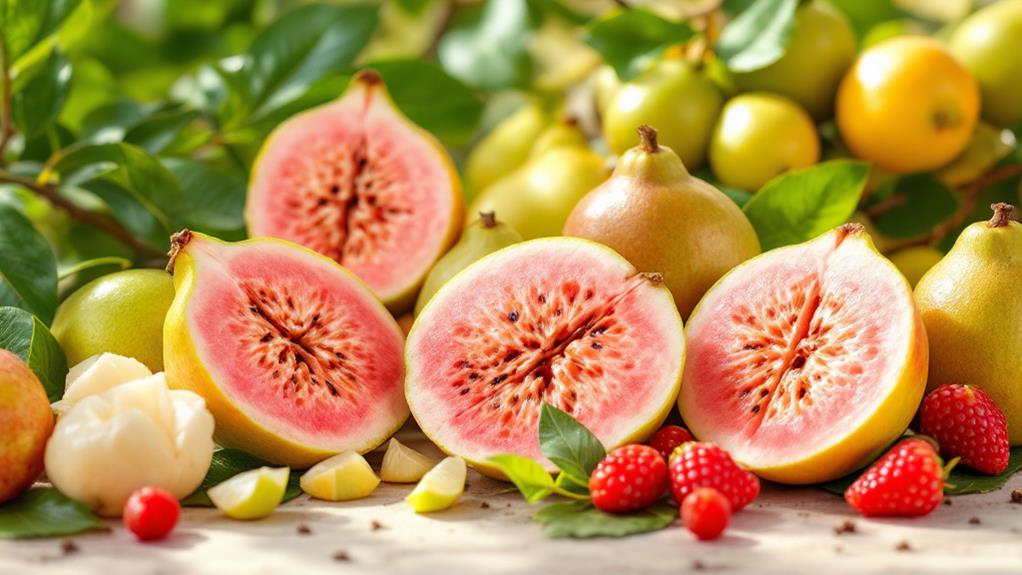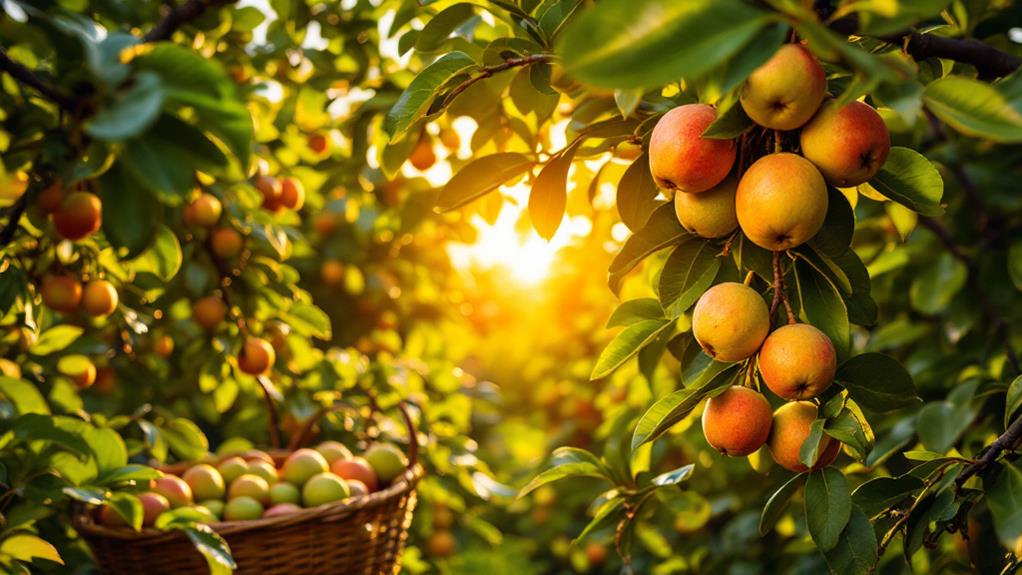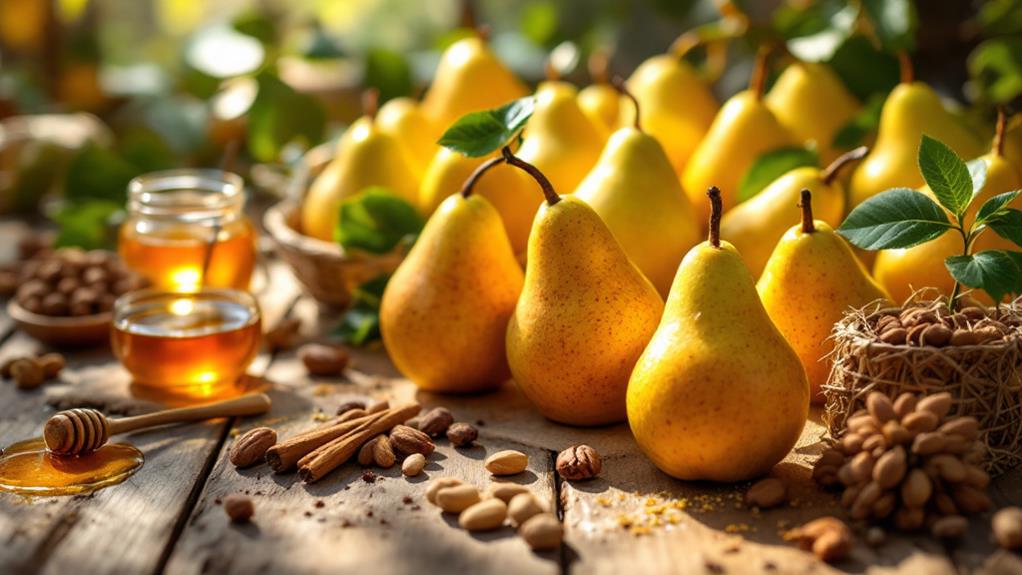A Guide to the Types and Benefits of Guava: A Tropical Powerhouse

When you investigate the world of guavas, you'll find an impressive array of varieties like the common guava with pink flesh, and the sweet strawberry guava with delicate red skin. Guavas are nutritional powerhouses, packed with Vitamin C to enhance your immune system, and dietary fiber that aids digestion. They're also low in calories and rich in potassium, which promotes heart health. Whole guavas can be eaten, offering maximum health benefits. Regardless of enjoyed fresh, in desserts, or as revitalizing drinks, guavas deliver a tropical flavor enhancement. Uncover the full spectrum of their benefits and uses beyond this brief taste.
Understanding Guava Varieties
When you investigate the world of guavas, you'll uncover a fascinating diversity among their varieties. As a tropical fruit, guavas offer a range of flavors, textures, and colors. The common guava, for instance, is larger with yellow skin and enticing pink flesh, making it a favorite in many culinary applications. On the other hand, the strawberry guava is small, sweet, and red with white flesh, appealing to those who prefer a more delicate flavor profile.
Indian guavas are particularly noted for their higher natural sugar content, adding a delightful sweetness that amplifies their appeal. This characteristic makes them a perfect choice for juices and purees, especially when considering white and pink guavas. These types are often favored for their balance of sweetness and texture, providing a base for both sweet and savory dishes.
Each guava variety, classified under the Myrtaceae family, brings its unique qualities to the table. With approximately 100 species globally, their diversity is as vast as their uses. Regardless of you're exploring their use in a tropical dessert or a revitalizing drink, guavas are a nutritional powerhouse that enriches any culinary experience.
Nutritional Value and Benefits
Exploring the nutritional value of guavas reveals their impressive health benefits. As a powerhouse of vitamin C, just one guava provides over 250% of your recommended daily intake. This vital nutrient enhances your immune system and promotes healthy skin. Guavas are not only rich in vitamin C but also contain antioxidants like lycopene. With 17% more lycopene than tomatoes, guavas help neutralize free radicals, supporting cell health and potentially lowering the risk of chronic diseases.
When it comes to dietary fiber, guavas stand out, offering 9 grams per cup. This high fiber content plays a significant role in digestion, helping to prevent constipation and alleviate diarrhea. Plus, the fruit's antimicrobial properties further support gut health. If you're watching your weight, guavas are an excellent choice. Each fruit is low-calorie, containing only 37 calories, making it easy to incorporate them into your diet for effective weight management without sacrificing flavor.
Moreover, guavas provide 63% more potassium per cup than bananas, promoting heart health and regulating blood pressure. With their array of medicinal properties and nutritional benefits, guavas are a remarkable enhancement to any diet.
Harvesting and Selecting Guavas

To fully enjoy the remarkable nutritional benefits of guavas, knowing how to properly harvest and select them is key. Regarding harvesting guavas, picking them while they're mature but not fully ripe guarantees ideal flavor development. Mature guavas will continue to ripen naturally at room temperature, bringing out their best taste profile.
When selecting fresh guavas, look for ones that are firm and have a green skin with a slight yellow tinge. This indicates they're at the right stage for flavor development. If you're choosing Thai varieties, aim for bright green ones. These fruits are available from November to April at farmers markets, specialty stores, and even online, making this the best time to find them.
Once you've selected your guavas, keep in mind that the entire fruit is edible, including the skin and seeds, which means you can fully utilize its nutritional benefits. As they ripen, the guavas will become softer to the touch, indicating they're ready to eat. By following these tips on harvesting and selecting, you guarantee you're getting the freshest guavas with the most potential for flavor and health benefits.
Culinary Applications of Guava
Guava's versatility in the kitchen makes it a delightful improvement to many dishes. When you're cooking with guava, you can enjoy the guava fruit fresh, slice it into salads, or blend it into guava smoothies for a burst of tropical flavor. Its high pectin content makes it perfect for desserts, allowing you to create delicious guava jelly, jams, and pastries. The natural sweetness and texture of guava paste can raise any dessert to a whole new level.
If you're looking for a revitalizing drink, guava juice is a popular choice, especially in the Caribbean. Use it as a mixer in cocktails or savor it on its own for a refreshing treat. Guava's unique taste also lends itself to creating spicy relishes that pair wonderfully with grilled meats and poultry, adding depth and excitement to your culinary creations.
You can incorporate guava into sauces and syrups for desserts, pancakes, and ice creams. Its tropical flavor shines in both sweet and savory dishes, making it a must-have ingredient in your kitchen. With so many ways to use guava, you'll find endless possibilities to investigate and improve your meals.
Health Benefits of Guava Leaves

A multitude of health benefits can be derived from guava leaves, making them a powerful natural remedy. Drinking guava leaf tea is a traditional practice backed by science, particularly effective for tackling digestive issues like diarrhea and abdominal pain. These leaves are packed with key nutrients found in their polyphenols and flavonoids, offering antimicrobial properties to combat bacteria and fungi effectively.
Guava leaf extracts are particularly beneficial for regulating blood sugar levels. If you're diabetic, these extracts can help suppress post-meal blood sugar spikes, providing a natural alternative to pharmaceutical interventions. The anti-inflammatory properties of tannins in guava leaves also make them a go-to for relieving menstrual cramps, often more effectively than conventional painkillers.
Not just for internal health, the oil extracted from guava leaves is rich in antioxidants, contributing to better skin health and offering potential anti-aging benefits. These antioxidants can help neutralize free radicals, reducing skin damage and promoting a youthful appearance. By incorporating guava leaves into your routine, you can tap into a range of health benefits, from digestive support to skin rejuvenation, making them a crucial enhancement to your wellness toolkit.




